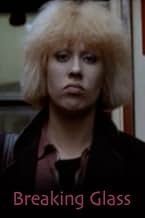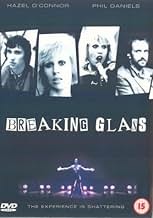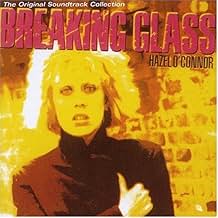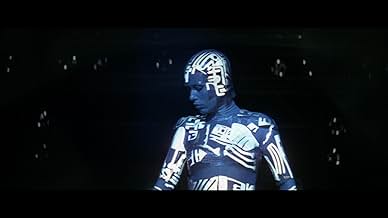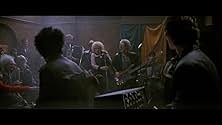Breaking Glass
- 1980
- Tous publics
- 1h 44m
IMDb RATING
6.8/10
1.7K
YOUR RATING
A rock singer is determined to rise to the top of the profession, letting nothing stand in the way of that goal.A rock singer is determined to rise to the top of the profession, letting nothing stand in the way of that goal.A rock singer is determined to rise to the top of the profession, letting nothing stand in the way of that goal.
- Nominated for 1 BAFTA Award
- 2 nominations total
Lowri Ann Richards
- Jane
- (as Lowri-Ann Richards)
- Director
- Writer
- All cast & crew
- Production, box office & more at IMDbPro
Featured reviews
Breaking Glass is a film that everyone aspiring to be in the music industry should see more than once. It is a very dark tale about the way a record company manipulates a singer to do things their way and to make as much money out of her as possible. Looking at some of today's 'search for a star' style TV shows on both in the UK and abroad I am always reminded of this film. Though not an expert on the subject, the winners of these shows tend to have one very big initial hit and then its downhill from there. This film predates these shows though the effect seems the same. After getting rid of her manager, played quite brilliantly by Phil Daniels, slowly but surely the record company changes her lyrics puts her on stimulants and she is eventually totally burnt out. You potential stars of tomorrow.... WATCH THIS AND BEWARE !!!
Breaking Glass is an excellent movie which has suffered from neglect and wholly inaccurate political associations. This movie was written and made in 1978 and 1979 and released in 1980. Therefore it couldn't possibly be: "A truly excellent portrayal of 80s Britain".Nor does it depict life in: "Thatcher's Britain".
In fact Breaking Glass depicts Callaghan's Britain, which was characterised by a deplorable catalogue of industrial disputes, strikes, high unemployment, and collapsing public services during the winter of 1978-9, dubbed the 'Winter of Discontent'.
What this movie is, is one of the best kept secrets in British cinema history. And although Hazel O'Connor enjoys second billing to Phil Daniels who had just done Quadrophenia to great acclaim, she is one of the greatest talents we've ever produced. Indeed, Hazel shines as the real star throughout, possibly drawing on her own personal experiences growing up in Coventry following the break-up of her parent's marriage, which lead to her running away to Europe at the age of 16.
I saw this film in the cinema the week it was released in the UK and I was stunned by both Hazel's singing and acting talent as well as that of the saxophonist superbly played (and dubbed) by Jonathan Pryce. That solo is a classic all on its own. Every feeling I felt at the time whilst watching this stark portrayal of human nature and the workings of the music industry has stayed with me until today.
In many ways Breaking Glass suffers from being too current. All stories of social history work best when set in the past. Quadrophenia worked because it spoke of a previous period of disruptive British history - 20 years in the past. Also, there was already an undercurrent of opposition to Thatcher, but the country the Conservatives inherited from Labour on 4th May 1979 was a wreck. So it was perhaps convenient for some to use it as a metaphor for the greed and excess that was in fact still yet to come.
See this movie and enjoy it for what it is: a landmark in British Cinema history and a brilliant one-off performance from everyone involved. And catch Hazel on the net, where she sells much of her music, and live on stage where she's still gigging.
In fact Breaking Glass depicts Callaghan's Britain, which was characterised by a deplorable catalogue of industrial disputes, strikes, high unemployment, and collapsing public services during the winter of 1978-9, dubbed the 'Winter of Discontent'.
What this movie is, is one of the best kept secrets in British cinema history. And although Hazel O'Connor enjoys second billing to Phil Daniels who had just done Quadrophenia to great acclaim, she is one of the greatest talents we've ever produced. Indeed, Hazel shines as the real star throughout, possibly drawing on her own personal experiences growing up in Coventry following the break-up of her parent's marriage, which lead to her running away to Europe at the age of 16.
I saw this film in the cinema the week it was released in the UK and I was stunned by both Hazel's singing and acting talent as well as that of the saxophonist superbly played (and dubbed) by Jonathan Pryce. That solo is a classic all on its own. Every feeling I felt at the time whilst watching this stark portrayal of human nature and the workings of the music industry has stayed with me until today.
In many ways Breaking Glass suffers from being too current. All stories of social history work best when set in the past. Quadrophenia worked because it spoke of a previous period of disruptive British history - 20 years in the past. Also, there was already an undercurrent of opposition to Thatcher, but the country the Conservatives inherited from Labour on 4th May 1979 was a wreck. So it was perhaps convenient for some to use it as a metaphor for the greed and excess that was in fact still yet to come.
See this movie and enjoy it for what it is: a landmark in British Cinema history and a brilliant one-off performance from everyone involved. And catch Hazel on the net, where she sells much of her music, and live on stage where she's still gigging.
I first came to breaking glass some years ago after having heard a track from the film. When I first watched it I thought it was shocking but after coming back to it years later I can see so much more in it. It's a truly excellent film depicting life in Thatcher's Britain as well as a wry view of the music industry. Hazel O'Conner is underrated in my view but she does excel here. Excellent film and even better soundtrack.
Hazel O'Connor is excellent and the movie is much more than just a musical. It reflects society as it was in the 'Thatcherite' era with it's excesses and prejudices. The storyline is believable and despite the low production cost, comes across very well. I would commend it to anyone. Hope that it is re-released on DVD.
It's almost impossible for me to be objective about this film. I first saw it in 1981 as a 12 year old drummer with stars in my eyes. I immediately begged my dad to get me the soundtrack on vinyl and was off memorizing the entire album. It is, by far, one of my favorite movies of all time. The story is decent, the acting is good, and the music is absolutely in tune with the period. The depiction of the music industry with it's main players often exploiting every new trend, sound and artist until it and they are completely exhausted is spot-on. What truly makes this film is the music. Each track is a perfect reflection of Kate's (Hazel O'Connor) journey and is pretty darn catchy to boot. (You'll be humming "Big Brother" for days.) I highly recommend this film, as have others in the forum, for anyone aspiring to be a musician for a living. It is a brilliant parable of having and maintaining control of your art and destiny.
Did you know
- TriviaThe movie was cut for its American theatrical release in the USA where approximately the last ten minutes and the ending were removed.
- Alternate versionsUS version lacks the ending with Kate in an asylum.
- ConnectionsFeatured in The 100 Greatest Musicals (2003)
- SoundtracksOne More Time
Sung by Victi Silva (as Victy Silva)
- How long is Breaking Glass?Powered by Alexa
Details
Box office
- Gross US & Canada
- $2,471
- Gross worldwide
- $2,471
- Runtime
- 1h 44m(104 min)
- Color
- Sound mix
- Aspect ratio
- 2.35 : 1
Contribute to this page
Suggest an edit or add missing content


